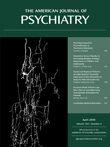For the past two decades, psychiatrists treating children and adolescents who have major depressive disorder have had difficulty finding evidence to support their clinical decisions. Time after time, randomized clinical trials have supported neither psychiatrists’ clinical experience nor extrapolation from studies of adults. Tricyclic antidepressants were considerably more lethal in overdose in youths than in adults, and moreover, research found no evidence for efficacy of tricyclics in the treatment of depression in youths
(1) . The first published controlled trial of fluoxetine for the treatment of major depression in youths showed efficacy
(2), and studies of fluoxetine in pediatric depression published since then have produced largely similar results. Other, newer antidepressants have at most a single controlled trial showing efficacy in the treatment of major depression in youths, and thus far studies of several antidepressants have not shown statistical superiority to placebo in well-designed trials in this population
(3) .
The most troublesome issue related to pediatric use of antidepressants has been warnings about increases in suicidal ideation and behavior in youths and young adults treated with selective serotonin reuptake inhibitors. No compelling data are available to indicate whether the net result of treatment of depressed youths with these compounds is an overall increase or an overall decrease in the hazard of completed suicide; there is limited but inconclusive evidence in each direction
(3) .
Clinicians will therefore be pleased to learn that continuation treatment with fluoxetine was found to prevent relapse of major depression in youths in a well-designed randomized controlled trial of good size. Of course, this is what virtually all clinicians were already doing based on common sense, clinical experience, and extrapolation from adult studies, and on this occasion our common sense has served our patients well.
In this issue, Emslie and colleagues report on a study of 102 youths 7–18 years of age with a primary diagnosis of major depressive disorder who had achieved good clinical response or remission in acute treatment with fluoxetine and then were randomly assigned to receive either fluoxetine or placebo in continuation treatment. Relapse was defined as persistent worsening in Children’s Depression Rating Scale—Revised (CDRS-R) score or a clinician determination of significant clinical deterioration. Of the patients in the fluoxetine group, 42% had a relapse during the 6-month blind continuation period, compared with 69% in the placebo group.
Relapse in terms of a second, stricter definition was examined by excluding clinician judgment and using only persistent worsening of the CDRS-R score. By that criterion, 22% of youths on fluoxetine relapsed, compared with 48% of those on placebo. Since participants were withdrawn from the study when they met the broader definition of relapse, these numbers do not include all those who would have met this stricter criterion had they stayed in the continuation study cell a bit longer. The design of the study thus reflected usual clinical decision making and did not keep patients in the study for whom that approach was no longer clinically reasonable. This strategy means that the 42% rate of failure on medication and the 69% rate of failure on placebo are the numbers that best reflect the experience our patients will have.
The 42% relapse rate in the fluoxetine group was disappointingly high. Just over half of patients who responded or remitted in acute treatment with fluoxetine had at least one residual depressive symptom when they entered the continuation treatment phase. Across both treatment groups the relapse rate was higher for those with one or more residual symptoms than for those with none, and the greatest difference in relapse rates was seen between the placebo and fluoxetine groups in those with no residual symptoms (67% versus 25%). Thus, fluoxetine continuation treatment was valuable across all participants but was particularly impressive in those who achieved complete symptom remission with acute treatment.
There are few real-world limitations to this study. Entering youths into continuation treatment when they have achieved substantial symptom response but not total remission certainly reflects clinical necessity and practice. Removing participants from the study and declaring a relapse based on clinician judgment in addition to reliable rating scales reflect good clinical care of children, whether in a research study or in everyday clinical practice.
What would have happened if psychotherapy had been added for those who did not achieve complete symptom remission? Clearly the Treatment for Adolescents With Depression Study
(4) and the Treatment of Resistant Depression in Adolescents study have taken the first steps in developing our understanding of how to combine psychotherapy and pharmacotherapy. The Emslie et al. study suggests not only that continuation treatment is important in youths who have been successfully treated with an antidepressant but also that we should push hard for full remission and not merely substantial response. We do not yet have, but clearly need, studies targeting the many youths who achieve significant response but fail to reach remission after acute treatment of their depression.
There are few surprises in this study, but there is now good science behind what we were all doing anyway, and that is important. Now we need to discover how to achieve remission, reliably and consistently, and not just response in our patients.

